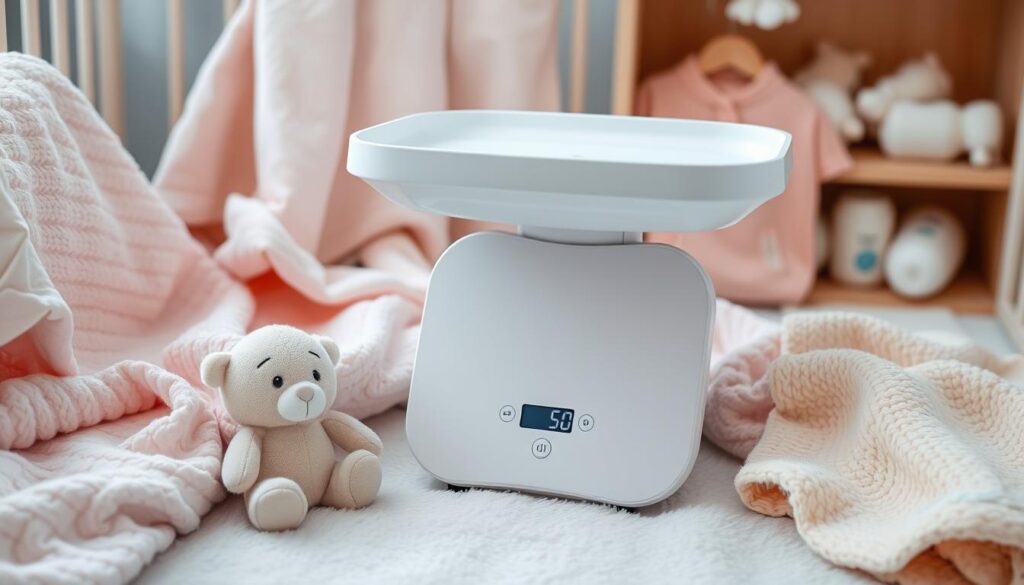Welcoming a new baby is exciting but also very careful. It’s key to watch their weight closely in the first days and weeks. The newborn weight loss calculator helps by comparing your baby’s weight to many others. This helps spot any weight problems early.
Dr. Ian M. Paul from Penn State Hershey Children’s Hospital talks about this tool. It’s the first of its kind for tracking your baby’s growth. By using your baby’s birth weight and later measurements, you can see how they’re doing. This makes sure they’re growing right.
Key Takeaways
- Newborn weight loss calculator helps track baby’s progress in the first days and weeks after birth
- Allows comparison of your baby’s weight to a large sample, aiding in early identification of issues
- Developed by experts to provide a comprehensive tool for monitoring newborn weight changes
- Enables parents and healthcare providers to ensure newborns are within recommended weight loss guidelines
- Crucial for promoting healthy growth and development in the crucial early stages of life
Understanding Normal Newborn Weight Loss Patterns
As a new parent, watching your baby’s weight is normal. Newborns often lose some weight in the first days. This is okay and part of adjusting after birth.
The American Academy of Pediatrics says a newborn should not lose more than 7% of their birth weight.
Initial Weight Loss After Birth
Babies who are breastfed usually lose 7-8% of their weight by the third day. This loss is because they get rid of extra fluid. This happens as they move from being inside the womb to outside.
Expected Weight Recovery Timeline
Most babies will get back to their birth weight in 10-14 days. The Newborn Weight Tool (NEWT) shows that some babies lose more than 10% of their birth weight. This tool helps parents know their babies are getting enough milk.
Factors Affecting Weight Changes
Many things can change a newborn’s weight, like how they were born, how much milk they get, and their own health. A study in Pediatrics found that how a baby was born affects their weight loss early on.
It’s important to watch your baby’s weight closely in the first weeks. Knowing about normal weight loss helps make sure your baby grows well.
Weight Loss Newborn Calculator: Essential Features and Benefits
As a new parent, it’s key to watch your baby’s weight closely. The first days and weeks are very important for their health. The weight loss newborn calculator is a great tool to track your baby’s growth.
This calculator compares your baby’s weight to many other newborns. It shows if your baby is losing or gaining weight like they should. This helps prevent serious problems like dehydration and brain issues.
The weight loss newborn calculator has some cool features:
- Personalized Weight Tracking: Just enter your baby’s birth weight. The calculator will show their daily weight changes on a special chart.
- Percentage Weight Loss Monitoring: It tracks how much weight your baby has lost. If they’re losing too much, it will let you know.
- Customized Feeding Recommendations: Based on your baby’s weight loss, it can suggest changes to feeding times or amounts.
- Early Intervention Prompts: If your baby loses too much weight, it will remind you to talk to your doctor.
Using the weight loss newborn calculator helps you keep an eye on your baby’s growth. It’s all about making sure your little one is healthy and growing well in those first weeks.
| Metric | Value |
|---|---|
| Sensitivity of the Newborn Weight Loss Tool (NEWT) in identifying exclusively breastfed newborns who develop excess weight loss (EWL) | 21% |
| Specificity of the NEWT in identifying exclusive breastfeeding newborns who do not develop EWL | 82% |
| Total original records | 280 |
| Excluded records | 60 |
| Paired newborn weights measured in-hospital and at day of life 4 | 220 |
| NEWT correctly identified EWL cases | 6 out of 28 |
How to Accurately Track Your Baby’s Weight at Home
It’s very important to watch your baby’s weight for their health. You can use a scale at home to do this. This guide will help you measure and record your baby’s weight right.
Required Measuring Tools
You’ll need a digital scale for your baby’s weight. It should be able to measure in small amounts, like 10 grams. Find a scale that can handle up to 40 lbs and gives exact numbers. You can find these online for about $50.
Step-by-Step Measurement Guide
- Take off your baby’s clothes and diaper for a correct weight.
- First, weigh yourself and write down your weight.
- Hold your baby and step on the scale with them. Write down the total weight.
- Then, subtract your weight from the total to find your baby’s weight.
Recording and Monitoring Tips
- Always weigh your baby at the same time each day. Their weight can change.
- Keep track of the weights in a special chart or notebook.
- Watch how your baby’s weight changes over time. It should go up slowly but steadily.
- If you see big changes or worry, talk to your doctor.
Home scales might not be as precise as doctor’s scales. But, they help you keep track of your baby’s weight between visits. Weighing your baby at home often can spot problems early. This way, you can work with your doctor to make sure your baby grows well.
Understanding Baby Growth Percentiles and Charts
As your little one grows, tracking their progress is key. You’ll use baby weight percentile and infant growth monitoring charts. These charts show how your baby compares to others of the same age and gender.
For example, if your 3-month-old’s weight is in the 40th percentile, they weigh more than 40% of others. A 50% is average. Below 50% means they weigh less, and above 50% means they weigh more.
The World Health Organization (WHO) has growth charts for babies up to 2 years old. The CDC says to use these charts. They help track your baby’s measurements over time, ensuring they grow healthily.
“The growth percentile calculator determines where your baby stands in comparison to other children of the same age based on weight, height, and head circumference.”
Babies grow differently, and that’s okay. What matters most is steady progress. If your baby is gaining weight and growing, they’re doing great.
If you’re worried about your baby’s growth, talk to your pediatrician. They can offer helpful advice to make sure your baby is doing well.
Signs of Healthy vs. Concerning Weight Loss
As your newborn’s weight changes in the first weeks, knowing what’s normal is key. It’s important to find a balance between healthy weight loss and signs of trouble.
Normal Weight Loss Indicators
Most full-term babies lose 5-10% of their birth weight in the first days. This is common and usually okay, as long as they’re eating well and having enough wet and dirty diapers.
By the end of the first month, your baby should be back to their birth weight or a bit more. Gaining 4-7 ounces a week is a good sign of healthy newborn development.
Red Flags to Watch For
If your baby loses more than 10% of their birth weight or doesn’t regain it by 2 weeks, worry. Other signs to watch for include:
- Excessive crying, lethargy, or signs of dehydration
- Jaundice (yellowing of the skin and eyes)
- Persistent hunger despite enough newborn nutrition
When to Contact Your Healthcare Provider
If you see any concerning signs, call your pediatrician right away. Early action is key to avoid problems and ensure your baby grows well. Your doctor can check things out and suggest what to do next.
Every baby grows differently. Keep in touch with your healthcare team to watch your baby’s growth. This way, you can quickly deal with any issues.
Impact of Feeding Methods on Newborn Weight
The way you feed your newborn can really affect their weight. Breastfed babies might lose more weight at first. This is because your milk is still getting ready. On the other hand, formula-fed babies might gain weight more steadily.
Some babies might need extra food if your milk isn’t enough. It’s important to watch how your baby eats, their diaper, and their weight. This helps make sure they get enough food, no matter how you feed them.
A big study looked at over 100,000 breastfed babies. It found that about 5% of vaginally born babies and over 10% of cesarean babies lost a lot of weight in the first 48 hours.
By 72 hours, more than 25% of cesarean babies had lost a lot of weight. Losing up to 8% of birth weight is normal. But losing more than 10% might mean your baby needs extra food.
Doctors say it’s key to check your baby’s weight often. They also help breastfeeding moms with tips on how to feed well. This ensures your baby gets enough to eat.
| Feeding Method | Initial Weight Loss | Weight Gain Patterns |
|---|---|---|
| Breastfeeding | May lose more weight initially as milk production establishes | Potential for more variable weight gain |
| Formula Feeding | May experience less initial weight loss | Potential for more consistent weight gain |
No matter how you feed your baby, it’s crucial to work with your doctor. This way, you can make sure your baby is growing well. With the right help, your baby can grow strong and healthy.

Monitoring Head Circumference and Length
As your newborn grows, tracking their head circumference and length is key. These measurements, along with weight, show how they’re growing and developing their brain.
Measuring Techniques
To measure head circumference, wrap a flexible tape around the widest part of their head. This is just above the eyebrows and ears. For length, lay them on a flat surface and measure from the top of their head to the bottom of their heel. Take multiple measurements for accuracy.
Growth Pattern Analysis
The Baby Growth Chart Calculator helps track head circumference and length. It shows how your baby compares to others of the same age. This helps spot any growth concerns and ensures healthy development.
Every baby grows differently. If measurements are outside the average, talk to your pediatrician. They can help with your infant growth monitoring and healthy newborn development.
Preventing Excessive Weight Loss in Newborns
Keeping a newborn’s newborn nutrition and healthy newborn development right is very important. Losing too much weight is a worry, but there are ways to stop it.
Feeding your baby often is key. Feed them when they want to, especially in the first days. Look for signs like sucking or lip movements. If you’re breastfeeding, make sure they’re getting enough milk.
- Supplement with expressed breast milk or formula if medically necessary to prevent excessive weight loss.
- Keep your baby cool during feedings to prevent sweating and unnecessary calorie burn.
- Consult a lactation specialist or your pediatrician if you’re concerned about your newborn’s weight loss.
Watching your baby’s eating and weight closely is important. This helps them stay healthy and grow well. Every baby is different, so talk to your doctor early if you notice anything off.

“Timely recognition and appropriate breastfeeding plans can help minimize excessive weight loss in newborns.”
Watching your baby’s weight and growth closely is key. And don’t hesitate to ask for help when you need it. This time is both exciting and challenging, but with the right support, you can handle it.
Role of Healthcare Providers in Weight Monitoring
When you start losing weight after having a baby, doctors are very important. They help watch how your baby grows. They use special scales and charts to see how your baby is doing.
Regular Check-up Schedule
Doctors set up many check-ups to watch your baby’s weight and health. They see your baby at 3-5 days, 2 weeks, 1 month, and more. They check how your baby eats and grows, too.
Professional Assessment Methods
Doctors use special tools to weigh your baby. They use these weights on charts to see how your baby is growing. This helps them help your baby grow healthy and strong.

